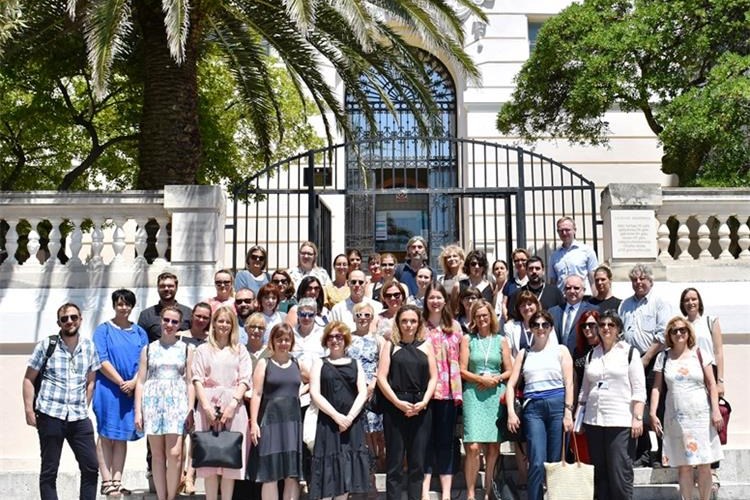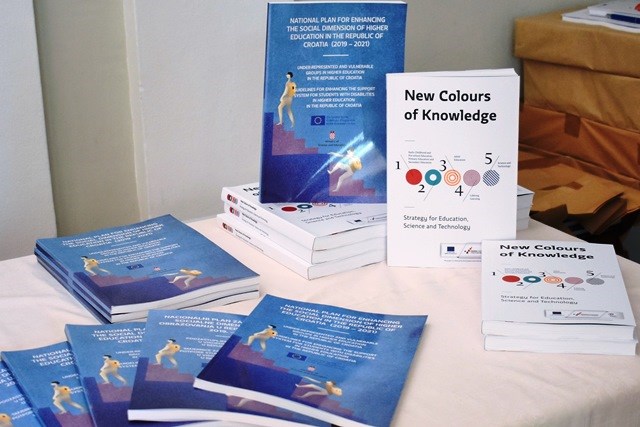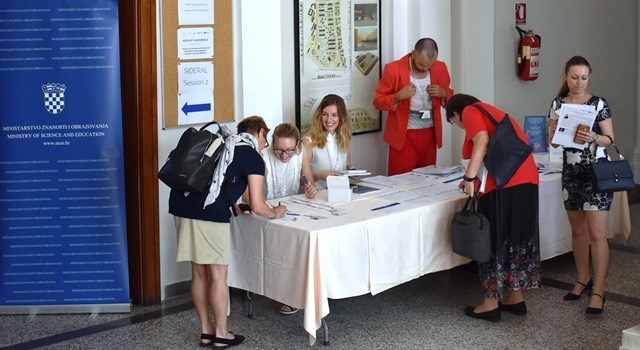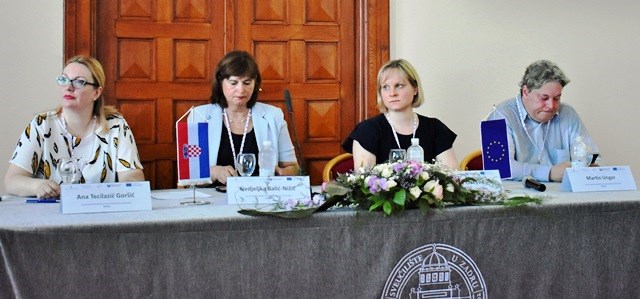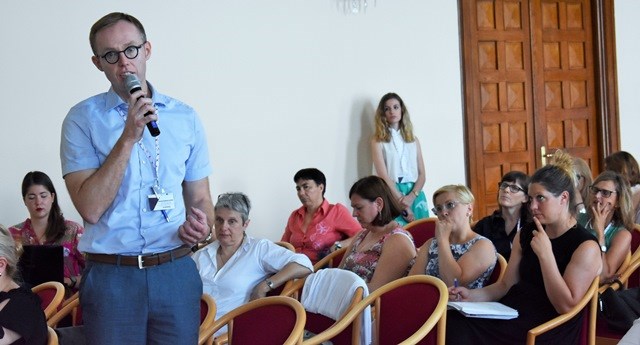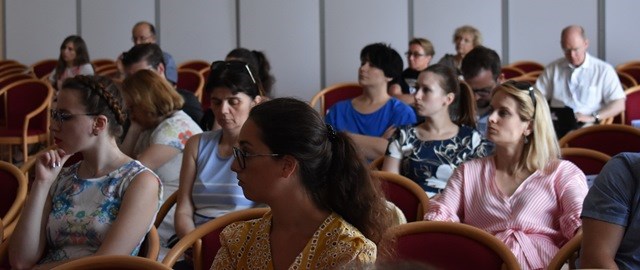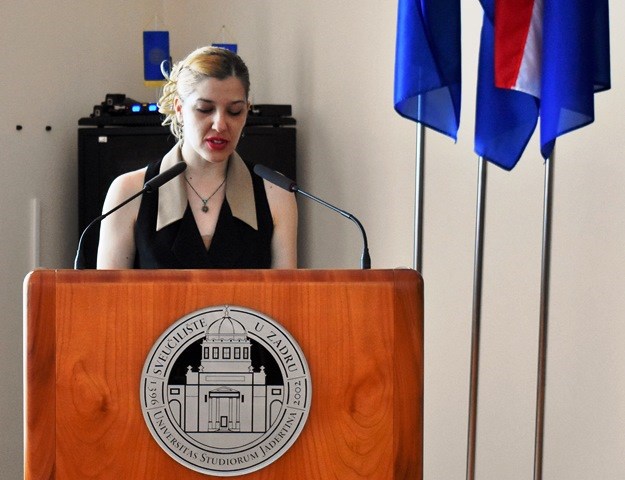- Published : 02.07.2019.
Social and International Dimension of Higher Education: conference at the Zadar University
Zadar, July 2 2019
The conference was organized to present the main goals of the project SIDERAL - Social and International Dimension of Education and Recognition of Acquired Learning, coordinated by the Croatian Ministry for Science and Education.The SIDERAL project was designed to support the implementation of the National Plan for Enhancing the Social Dimension of Higher Education in the Republic of Croatia (2019 – 2021) and improving the conditions for vulnerable and underrepresented groups of students. It includes mapping and evaluating the effectiveness of existing measures for improving social dimension of higher education. Additionally, guidelines for recognition of prior learning will be developed as a tool for higher education institutions in increasing diversity and social inclusion of vulnerable and underrepresented groups.
The conference was opened by Ms. Ana Tecilazić Goršić, representative of the Ministry of Science and Education and professor Nedjeljka Balić-Nižić from the University of Zadar. The programme aimed to encourage discussions on improving social dimension of higher education on the European level. Plenary presentations of international experts and two parallel thematic sessions were organised; one on social dimension and the other on recognition of prior learning.
Some of the main conclusions pertaining to the social dimension of higher education were as follows:
- Although the implementation of the social dimension in certain aspects requires financial investments, such as scholarships, incentives, adaptation of infrastructure, etc., there is a significant number of measures that do not require any costs, such as adaptations in teaching and assessment or web sites and information available to vulnerable and underrepresented groups. These measures can be undertaken immediately by higher education institutions and as such can contribute significantly to the improvement of the social dimension.
- Higher education institutions and their representatives are ready to actively engage in the implementation of activities envisaged by the National Plan and some have already started developing institutional strategies.
- It is important to work on improving social dimension across all levels of education in order to achieve better conditions and starting points for vulnerable and underrepresented groups in higher education. Although the focus of the project and of the National Plan is to carry out improvements in achieving equity and diversity in higher education, the most profitable investment in this aspect is intervention in earlier levels od education - preferably early childhood and preschool education.
- The experiences from Austria (on both national and institutional policy levels) have shown that it is equally important to provide political support for the implementation of a national strategy, as well as to have a commitment of key stakeholders within the higher education system in order to improve the social dimension. It is important to provide a cross-sectoral approach for implementing the measures of any strategy.
- Examples of implementation of social dimension from Austrian higher education institution have shown that it is important to improve the management of higher education and establish diversity management in order to ensure the effective implementation of the goals of the strategy. Thus it is necessary to change the paradigm of higher education management. Strengthening diversity can be seen as a necessary prerequisite for improving the quality of the overall work of the higher education institution. This means that the social dimension can be seen as a development mechanism for improving the quality of learning and teaching, research, testing and feedback, increasing proactivity of teachers and students, and improving the learning environment. In this sense, the social dimension encompasses a wider development potential than just its contribution to social justice.
Some of the main conclusions pertaining to the recognition of prior learning in higher education were as follows:
- Recognition of prior learning (RPL) is enabled by the shift to learning outcomes and student--cantered learning and teaching. Furthermore, the implementation of a system that would allow for the recognition of student’s prior learning, including both informal and non-formal learning outcomes, can indirectly improve the overall programme quality as it relates to, learning outcome based assessment, student’s expectations of learning based on outcomes, flexibility of study programs and the focus on students.
- Although a whole range of instructions and guidelines have been adopted at the European and national level, including Croatia, few higher education institutions have actually implemented RPL in practice. Thus the SIDERAL project, together with several related and connected international projects, aims to enable the practical application of RPL that will be carried out by the institutions. Pilots are envisaged to take place during the academic year 2019/2020 and higher education institutions are invited to inform the Ministry if they want to participate.
Conference speakers were international experts on social dimension and RPL from Austrian and Swedish ministries, agencies, institutes and higher education institutions, as well as experts and representatives from international associations such as the European Students' Union (ESU) and the European University Association (EUA) and Croatian higher education institutions. The conference was attended by about 60 participants from five European countries. The conference was moderated by Ana Jerković from the Ministry of Science and Education.
Partner institutions in the SIDERAL project are Austrian Ministry of Education, Science and Research, Swedish Council for Higher Education, and European Students' Union.
SIDERAL project also co-funds Bologna Follow-Up Group (BFUG) Advisory Group on Social Dimension.
The project is co-funded by the Erasmus+ Programme - Key Action KA3 - Support to the implementation of the European Higher Education Reform (EHEA) reforms.
Dokumenti
- Anna-Lena Claeys-Kulik, Strategies towards equity, diversity and inclusion at higher education institutions in Europe, INVITED project survey outcomes (1067kb)
- Robert Napier, Social Dimension in Higher Education (1652kb)
- Martin Unger, Why is there so little progress on the social dimension in the Bologna Process? Some hypotheses (477kb)
- Maria Keplinger, Social dimension in Higher Education: Austrian National strategy on the social dimension of higher education (1228kb)
- Martina Gaisch, The Social Dimension in Higher Education: The HEAD CD Frame (1317kb)
- Aleksandar Šušnjar, Croatian National Plan for the Enhancement of Social Dimension of Higher Education (828kb)
- Nedjeljka Balić-Nižić, Social Dimension in Higher Education: Implementation of National Policies at HEIs in Croatia (411kb)
- Anders Ahlstrand, Recognition of Prior Learning in practice: A EHEA Reform Project (835kb)
- Barbara Birke, Recognition of Prior Learning as a Tool for Enhancing Inclusion: The Austrian Example (249kb)
- Đurđica Dragojević, SIDERAL - Social and International Dimension of Education and Recognition of Acquired Learning (658kb)
- Diana Šimić, Learning Analytics and Assessment in Higher Education (2333kb)
